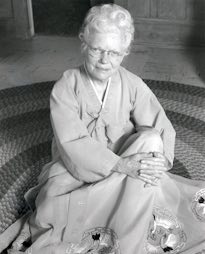Bertha Holt was a pioneer in international adoption who became known to thousands of internationally adopted children as “Grandma Holt.” She and her husband Harry, already the parents of six children, adopted eight Korean children in 1955, after seeing a documentary film about the wretched conditions of orphaned Amerasian children in Korea.
An Act of Congress was required to allow the Holts to adopt these eight children, ranging in age from eight months to two years. The national
attention that followed prompted numerous requests to the Holts for help in adopting children from Korea.
In 1956, the Holt Adoption Program, later called Holt International Children’s Services, was established to help hundreds of people interested in intercountry adoptions. Hundreds of thousands of orphaned children worldwide now have families through the efforts of this agency.
Her work helped change the world’s attitudes about adoption. She challenged the then established policy of matching children and adoptive parents by appearances and demonstrated that differences in race or national origin are not barriers to forming strong families.
Bertha Holt also became an advocate for children with special needs. She planned and designed the Ilsan Center in Korea to accommodate children with disabilities. Holt developed principles for the temporary care of children that are still used today as models.
Numerous awards and honors were bestowed on Bertha Holt including America’s Mother of the Year, two National Civil Merit Awards from Korea, the Decade of the Child Medallion from the Philippines, and several honorary doctoral degrees.
The Holt International Children’s Services, headquartered in Eugene, Oregon, is regularly asked by the United States Congress and by other countries for advice in determining adoption and child welfare policies. Guided always by their motto, “Every child deserves a home of his own,” the Holt agency continues the legacy of its founders.

